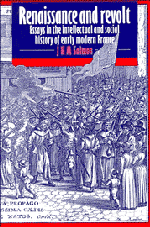Book contents
- Frontmatter
- Contents
- Acknowledgements
- Introduction
- Part I Humanism, stoicism, and interest of state
- 1 Cicero and Tacitus in sixteenth-century France
- 2 Protestant jurists and theologians in early modern France: the family of Cappel
- 3 French satire in the late sixteenth century
- 4 Rohan and interest of state
- Part II Sovereignty, resistance, and Christian obedience
- Part III Structures and fissures
- Index
4 - Rohan and interest of state
Published online by Cambridge University Press: 23 December 2009
- Frontmatter
- Contents
- Acknowledgements
- Introduction
- Part I Humanism, stoicism, and interest of state
- 1 Cicero and Tacitus in sixteenth-century France
- 2 Protestant jurists and theologians in early modern France: the family of Cappel
- 3 French satire in the late sixteenth century
- 4 Rohan and interest of state
- Part II Sovereignty, resistance, and Christian obedience
- Part III Structures and fissures
- Index
Summary
There is a persuasive simplicity about the opening lines of Rohan's De l'Interest des Princes et des Estats de la Chrestienté:
Princes command peoples, and interest commands princes. Knowing this interest is infinitely superior to knowing about the actions of princes, which in themselves are far above the deeds of ordinary people. The prince can be deceived, his council can be corrupted, but interest itself can never fail. Depending on whether it is well or badly understood, it preserves or ruins states. It always has expansion as its aim or, at the very least, the preservation of the state, and to succeed in its purpose it has to change with the times. Therefore to consider properly the interest of princes it is not necessary to go back very far, but merely to turn one's eyes to present affairs.
When Meinecke referred to these sentences he remarked how they made the heart of the modern reader beat faster. In that part of Die Idee der Staatsréson where he analyses Rohan's work, Meinecke restates the central theme of his own book in its most powerful form. Rohan is said to reveal that reason which is immanent in the state itself (die dem Staate selbst immanente Vernunft). He is assumed to articulate the principles that guided Richelieu's statecraft, and together the two express the ultimate vision of the statesman (der Schwung staatsménnischen Denkens). The statesman who has this insight into true interest of state loses the freedom of personal choice and becomes a soldier in the service of the Idea (ein Soldat im Dienste der Idee).
- Type
- Chapter
- Information
- Renaissance and RevoltEssays in the Intellectual and Social History of Early Modern France, pp. 98 - 116Publisher: Cambridge University PressPrint publication year: 1987



